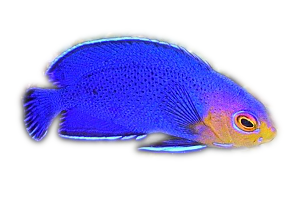
By Bob Goemans

Likely Reef Tank Suitable
Likely Fish-Only Tank Suitable
Range: Indo-West Pacific Ocean: Philippines and Indonesia.
Size: 3 inches (6 cm)
Natural Environment: Inhabits caves in rocky outcrops and is usually found between depths of 15 to 200 feet (5 – 60 m) where it feeds on small worms and crustaceans/zooplankton.
General Husbandry: Occasionally seen in the trade and an attractive species having dark reddish body with a pale red to orange head.
Can be maintained in reef or fish-only aquariums having some rocky hiding places/crevices to take shelter, as this species is secretive, especially upon first entering the aquarium. However, it will become bolder and become a fairly good tankmate, for a dottyback, with other tankmates if they are slightly larger and moderately aggressive. Yet will annoy smaller fishes.
As to diet, products such as marine fish and crustacean flesh, clams, and other marine meaty foods should make up the majority of their diet. Therefore a meaty diet such as enriched chopped fresh fish or shrimp flesh, and/or frozen carnivore foods should be fed once daily.
Taxonomy:
Order: Perciformes
Suborder: Percoidei
Family: Pseudochromidae
Subfamily: Pseudochrominae
Genus: Pseudochromis
FYI: Since they are extremely fast moving and secretive, if having to remove it from a reef aquarium with many hiding areas, it would be a major task!
One per aquarium.
Experience Level: Intermediate
Temperament: Semi-aggressive
Diet: Carnivore
Coral Safe: Yes
Fish Safe: With caution
Invertebrate Safe: With caution
Acclimation Time: 30 minutes+
Aquarium Environment: Reef or fish-only aquarium
Tankmates: Larger/moderately aggressive
Minimum Tank Size: 30+ gallons
Temperature Range: 72 - 81°F (22 – 27°C)
Specific Gravity: 1.020 - 1.026
pH: 8.0 - 8.5
